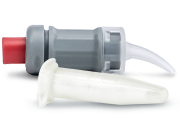
Tips to prevent tooth decay and the need for pediatric crowns.
From infancy, children face an environmental and dietary up-hill battle. Young parents are often undereducated when it comes to safeguarding their children’s dental health. Babies falling asleep in strollers or cribs with milk bottles in their hands, introducing Coca-Cola and other soft drinks to children as young as six months of age, and substituting juice for water between meals are all common factors contributing to tooth decay in today’s society.
Often parents will say, “My baby’s teeth came in rotten.” Sadly, this observation is quite true. As soon as the deciduous “baby teeth” break through the gums, diet, and lack of dental hygiene begin the decaying process that inevitably leads to chronic pain, dental abscesses, emergency room visits, infection, and ultimately early extraction of these teeth. This phenomenon is not restricted to older children. I have personally been involved with children as young as 16 months who have already required multiple extractions and restorative treatment on all their erupted teeth. It is sad to experience how this preventable disease destroys the smiles of even the babies in our communities.
As parents, it is our responsibility to protect our little ones. Setting good examples and creating an environment that promotes health and safety should be part of our daily commitment. Educating our children to adopt good health habits is no exception. The example we set teaches our kids a lot about who we are. Taking good care of our own teeth and showing our children the importance of good oral hygiene will help establish habits that will last them a lifetime.
You can play an active role in caring for your child’s teeth and preventing tooth decay by following these guidelines for good oral health.
1. Start from birth
Protect your baby from developing “bottle rot.” Don’t let your child go to sleep with a bottle in her mouth. Give your child water when he’s thirsty between meals and avoid giving your baby juice or soft drinks. Encourage drinking plenty of pure water.
2. Get dental checkups early.
The American Dental Association and the Academy of Pediatric Dentistry recommend that your baby have his first dental visit within six months of the appearance of the baby’s first tooth but no later than the child’s first birthday. This first visit not only gets your child familiar with the dentist’s office but can also help prevent little problems from becoming big ones down the road.
3. Establish a tooth-brushing and flossing routine early… and make it fun!
Let your baby play with the toothbrush before and after brushing. By making brushing and flossing fun, your child will be more cooperative and allow you to do a better job. Brushing time should be about two minutes and should be done by a parent or caregiver until your child is around five years of age. After that, continued parental supervision is still important to make sure that the teeth are getting cleaned adequately. Your dentist can provide you with small tablets that will help expose areas that might need more attention.
4. Avoid sugary snacks and sticky foods.
There are natural bacteria in the mouth; and when exposed to sugar, these bacteria start to produce an acid that breaks down the tooth surface and causes cavities. Frequent or prolonged exposure to sugars will increase the likelihood of this process. Common sources of sugar include candy and soda but also fruit juice and even breast milk. It is important that you do not use these sugary liquids as a paci”er in a bottle for your child throughout the day.
5. keep your child’s mouth clean.
Brush and floss your child’s teeth after meals using a child-size toothbrush. Do not use excessive amounts of toothpaste, and make sure your child does not swallow the toothpaste. If you are on the road and do not have a toothbrush handy, have your child drink some water. This will help dilute the sugars and help rinse the teeth.
6. Encourage your child to drink from a cup by one year of age.
When children are thirsty, encourage water throughout the day. This will not only be good for their teeth but will also promote a healthy habit that will benefit their overall health for life.
7. Teach your child good eating habits.
Eat a balanced diet, and limit starchy or sugary foods like chips, candy, and soda. When these foods are eaten, include them in the main meal instead of using them as in-between-meal snacks. The extra saliva flow during a meal will help to rinse these sugary foods out of the mouth.
8. schedule regular visits with your pediatric dentist.
Dental professionals can help educate, encourage, and motivate you. They can also check for early signs of problems and address them while they are still small and easily fixed.
Healthy teeth and gums are what all parents want for their children. Following a few basic steps with consistency will enable your children to enjoy happy, healthy, smiles.
Find a provider
Let us help you find a caring dentist near you.
Contact us

